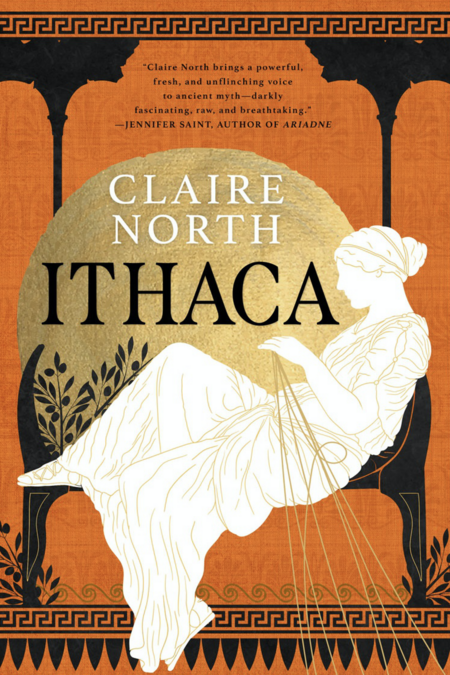Mythologies, no matter the culture, are wondrous things to dive into.
They give you a rich insight into a people’s culture, what matters to them and the values that underpin their belief system and which shape/have shaped them and their society.
But fascinating though the storytelling can be, they often leave you feeling curiously uninvolved and emotionally detached, due in large part to the fact that because they are stories of gods and their deeds and they are, by definition in these tales, beyond our understanding, and we are there to instructionally witness the epic and the impressive, and not necessarily the intimate and the fallibly human.
In Ithaca, her telling of the story of Penelope of Ithaca, wife of Odysseus who sailed to battle in Troy with all the men of fighting age from the island and never returned, Claire North turns this emotional remoteness completely on its head, taking us into a world where goddesses such as Hera roam and interfere where they should not, and where women, for the greater part, are left to pick up the pieces of a society reduced to poverty and turpitude by war.
In traditional Greek society, men are the only ones who are allowed to make decisions and get things done; women are simply supposed to be decorative placeholders, there to take up the space but not expected to actually do something lest they sully the reputedly superior acts of men.
The old men stay behind, studying their hands, before finally Medon, who always had a decent head for these things, glares at his assembled colleagues and snaps: ‘I’ve had sneezes with more guts than you,’ and follows Penelope out.
But in this retelling, which is searingly and cleverly condemnatory of this societal misogyny which sees smaller western island kingdoms like Ithaca left at the mercy of raiders and economic misfortune, the women are, to quote the Eurythmics’ song (featuring the great Aretha Franklin, “sisters are doing it for themselves”, scornfulness of rump male-centric society be damned.
Penelope, married to King Odysseus when she was barely into womanhood, is not at all like her robustly brazen cousin Clytemnestra who in the wake of a war in Troy caused triggered by their mutual Spartan cousin Helen, is lording it over her husband Agamemnon’s kingdom of Mycenae as if she is a ruler herself.
By way of stark contrast, Penelope who has her hands full fending off a legion of suitors at bay, all of whom she must show financially crippling hospitality while they remain on Ithaca, prefers to fly low and unnoticeable, relying on quiet manipulation and nuanced exercise of her power and influence, such as it is constrained by a society which does not recognise it and poets who will not song of it, to protect Ithaca from the predations of men who a vacuum of power and aim to exploit it.
Penelope, by acknowledged custom, must remarry now Odysseus has been lost for 18 years and secure her husband’s kingdom through marriage, whether it suits her or benefits her at all.
Her needs do not matter in this patriarchal world; she must agree to marry a suitor, hope they do not kill her naively arrogant son Telemachus in the process and hope that is enough to secure the fortunes of Ithaca.
The glorious thing about Ithaca, quite apart from the fact that it makes the affairs of gods and ancient people feel accessibly here and now, is that Penelope is not willing to simply do what she’s told.
Oh, on the surface she is as compliant as is demanded of her, saying all the right things, doing all the expected things and letting social custom run its sclerotically misogynistic course, but below the surface of proprietary and observant custom?
Well, that is an entirely different thing indeed and while the men that do remain, all of whom are too young or too old to be of much good, posture and get ready to make sure and defend the kingdom, Penelope quietly empowers and mobilises the women of the island to prepare for war, within and without, and to ward off and blunt the sword (literal and otherwise) of the gathering threats arrayed against Ithaca.
It is enthralling to read about and immerse yourself and it fills this stunningly complex but wholly accessible novel with a degree of sharply warm and necessary humanity that brings the ancient past alive and reminds us that here are people, not of ruined temples and fallen Doric columns, but of love, life and the need to live lives that mean something and which are not held hostage by convention that supposedly must be upheld, even in the paucity of current circumstance.
‘Terrible, terrible deaths,’ Medon offers feebly, his final word.
Penelope rests a hand gently on his arm. ‘Matters are coming to a head,’ she declares, without malice or delight. ‘There are things upon which I will still need your help.’
With characters who feel like they are leaping vivaciously off the page, and rewoven ancient myth that feels breathtakingly modern and rawly, emotionally honest, Ithaca is an engaging triumph, a novel that gives us the staggeringly epic length and breadth of myth but which goes to the very humanity which beats at it heart.
It also challenges the status quo and reveals, in ways humourously wry and intensely savage, how foolish it is to cling to old tradition just for the sake of it, when the demands of contemporary emergencies demands a far more nimble and flexible new approach and a willingness to do what needs to be done, convention be damned.
Caught between those are dismissive of the past and those who demand it be upheld regardless of what’s happening in the moment, Penelope’s story is one of a brilliantly clever and compassionate woman who knows that blunt-forced sedition won’t work and that, if she is to preserve the kingdom of Ithaca and the lives of those who matter to her and who fall under her care, that she must act quietly and carefully and without the obvious rebelliousness of people like Clytemnestra whose approach may sing loud but which is bringing nothing but retribution and danger.
Ithaca is gloriously, vibrantly rich and involving, a story as old as two millennia plus but which feels fresh and relevant, replete as it is with dead in the water tradition coming hard up against necessary, fresh ways of doing of thinking, and which underscores how humanity would do well to listen to all the members of society and not decide, to its detriment and likely eventually fall, that only some have voices worth hearing and acting on.
The story of Penelope, retold with vibrancy, power and potent emotional effect by Claire North in Ithaca, shows how impoverished the realm of unquestioned tradition can be, especially when unvisited by fresh perspective and a willingness to even consider change, and why we must let people like Ithaca’s saviour queen be heard and heeded and how that just might be the saving of all of us.

